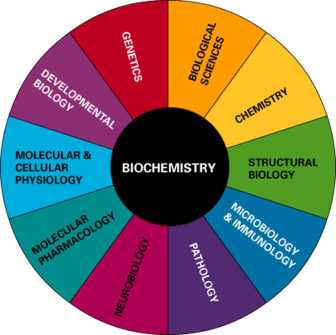Biochemistry
Biochemistry, it is sometimes called as biological chemistry, is the study of chemical processes in the living organisms, including, but is not limited to living matter only. The laws of biochemistry govern all the living organisms and their processes. By controlling the flow of information through biochemical signaling and the flow of chemical energy through the action of metabolism, biochemical processes give rise to complexity of life.
Much of the biochemistry deals with functions, structures, and interactions of cellular components like proteins, lipids, carbohydrates, nucleic acids and many other biomolecules —although increasingly processes instead of individual molecules are the major focus. Among the vast number of different biomolecules, many of them are complex and large molecules (called as biopolymers), which comprises of similar repeating subunits (called as monomers). Each and every class of polymeric biomolecule has different set of subunit types. For instance; a protein is a polymer whose subunits are selected from a set of 20 or more amino acids. It studies the chemical properties of important biological molecules, like proteins, and the chemistry of enzyme-catalyzed reactions.

The biochemistry of the cell metabolism and endocrine system has been described extensively. The other areas of biochemistry include genetic code (such as DNA, RNA), protein synthesis, signal transduction and cell membrane transport.Over the last forty years biochemistry has become successful at explaining the living processes that now almost all the areas of the life sciences from botany to medicine are occupied by biochemical research. Now days the major focus of pure biochemistry is in understanding the biological molecules and how they give rise to the processes that occur within the living cells, which in turn relates significantly to the study and understand whole organisms.